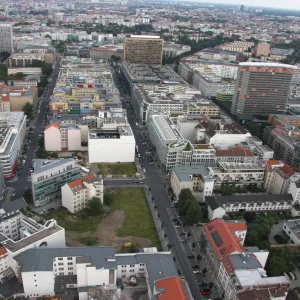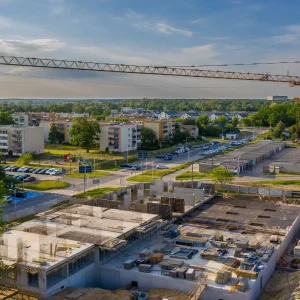
The growing trend of societal polarisation presents unique challenges and opportunities for urban policy, planning, and transportation. As cities become increasingly divided along socio-economic, political, and cultural lines, urban planners and policymakers must address these divides to foster inclusive, sustainable, and resilient urban environments. This article explores the implications of societal polarisation on urban development and highlights strategies for mitigating its negative impacts while capitalising on potential opportunities.
The Nature of Societal Polarisation
Societal polarisation refers to the growing divide between different segments of society, often along political, economic, cultural, or ideological lines. This phenomenon can lead to heightened tensions, reduced social cohesion, and increased conflict. In urban settings, polarisation can manifest in various ways, including spatial segregation, unequal access to resources, and disparate levels of civic engagement.
Political Polarisation
Political polarisation, characterised by increasing ideological distance between political parties and their supporters, can significantly impact urban policy. As cities become battlegrounds for competing political ideologies, consensus on critical issues such as housing, transportation, and social services can become elusive.
Economic Inequality
Economic polarisation is marked by the widening gap between the wealthy and the poor. This divide can result in stark contrasts in living conditions within urban areas, with affluent neighbourhoods enjoying superior amenities and services, while disadvantaged communities face deteriorating infrastructure and limited opportunities.
Cultural and Social Divides
Cultural and social polarisation, driven by factors such as ethnicity, religion, and lifestyle, can lead to fragmented urban communities. These divisions can exacerbate tensions and hinder efforts to create cohesive, inclusive urban environments.
Impacts on Urban Policy and Planning
Housing and Spatial Segregation
Societal polarisation often leads to spatial segregation, where different socio-economic groups reside in distinct areas. This segregation can perpetuate inequalities, as marginalised communities may have limited access to quality housing, education, and healthcare. Urban planners must address these disparities by promoting mixed-income housing developments and inclusive zoning policies.
Transportation Inequities
Transportation systems in polarised cities often reflect and reinforce socio-economic divides. Wealthier areas may benefit from efficient public transport, while lower-income neighbourhoods face inadequate services and poor connectivity. To bridge this gap, urban transportation policies must prioritise equitable access to reliable and affordable transit options for all residents.
Public Services and Infrastructure
The provision of public services and infrastructure can be significantly impacted by societal polarisation. Disparities in funding and political support can result in unequal access to essential services such as healthcare, education, and public safety. Policymakers must work to ensure that all urban residents receive fair and adequate public services, regardless of their socio-economic status.
Civic Engagement and Participation
Polarisation can lead to decreased civic engagement and participation, as marginalised groups may feel disenfranchised and distrustful of political processes. Encouraging broad-based participation in urban planning and decision-making processes is crucial for fostering inclusive and democratic cities.
Strategies for Addressing Societal Polarisation in Urban Policy
Promoting Inclusive Urban Design
Inclusive urban design aims to create environments that accommodate the diverse needs of all residents. This approach involves designing public spaces, transportation systems, and housing developments that are accessible and welcoming to people of different ages, abilities, and socio-economic backgrounds. By prioritising inclusivity, urban planners can help bridge societal divides and foster social cohesion.
Equitable Resource Allocation
Equitable resource allocation is essential for addressing the disparities created by societal polarisation. Policymakers must ensure that funding for public services, infrastructure, and development projects is distributed fairly, with a focus on uplifting disadvantaged communities. This may involve targeted investments in under-served areas and the implementation of policies that promote social and economic mobility.
Participatory Planning Processes
Engaging diverse communities in the urban planning process is key to addressing societal polarisation. Participatory planning processes involve actively involving residents in decision-making, ensuring that their voices are heard, and their needs are met. This can help build trust, foster a sense of ownership, and promote more equitable and sustainable urban development.
Policy Integration and Coordination
Addressing societal polarisation requires a holistic approach that integrates various policy areas, including housing, transportation, economic development, and social services. Effective coordination among different levels of government, as well as collaboration with non-governmental organisations and the private sector, is crucial for implementing comprehensive and cohesive urban policies.
Case Studies: Addressing Polarisation in Urban Settings
Barcelona: A Model for Inclusive Urbanism
Barcelona has implemented several initiatives aimed at addressing societal polarisation and promoting social cohesion. The city’s superblocks programme, which prioritises pedestrians and cyclists over cars, has transformed neighbourhoods into vibrant, inclusive public spaces. Additionally, Barcelona’s housing policies focus on providing affordable housing and preventing displacement, ensuring that all residents have access to quality living conditions.
Medellín: Transforming a Divided City
Medellín, Colombia, offers a powerful example of how urban policy can address societal polarisation and transform a divided city. Once known for its high levels of violence and inequality, Medellín has implemented innovative urban planning and social policies to promote inclusion and reduce disparities. The city’s Metrocable system, a cable car network that connects impoverished hillside communities with the urban centre, has significantly improved access to education, employment, and healthcare for marginalised residents.
Copenhagen: Fostering Social Cohesion through Urban Design
Copenhagen’s approach to urban planning emphasises social cohesion and inclusivity. The city’s commitment to creating high-quality public spaces, promoting cycling and public transportation, and ensuring affordable housing has helped bridge socio-economic divides and foster a sense of community. Copenhagen’s urban design principles prioritise accessibility and inclusiveness, ensuring that all residents can benefit from the city’s amenities and services.
The Role of Technology and Innovation
Smart Cities and Data-Driven Decision Making
The advent of smart city technologies offers new opportunities for addressing societal polarisation in urban areas. Data-driven decision making can help identify and address disparities in access to services, optimise resource allocation, and improve the efficiency of urban systems. By leveraging technology, cities can create more responsive and equitable urban environments.
Digital Inclusion and Access
Ensuring digital inclusion is crucial for addressing societal polarisation in the information age. Access to digital technologies and the internet can empower marginalised communities, providing them with opportunities for education, employment, and civic engagement. Urban policies must prioritise digital infrastructure and inclusion initiatives to bridge the digital divide and promote social equity.
Participatory Technologies
Emerging participatory technologies, such as digital platforms for community engagement and crowdsourcing, can enhance civic participation and empower residents to contribute to urban planning processes. These tools can help ensure that diverse voices are heard and that urban policies reflect the needs and aspirations of all community members.
Challenges and Considerations
Balancing Competing Interests
One of the primary challenges in addressing societal polarisation through urban policy is balancing the competing interests of different groups. Policymakers must navigate complex political and social dynamics to create policies that are fair and inclusive. This requires careful negotiation, transparent decision-making processes, and a commitment to equity.
Addressing Structural Inequalities
Societal polarisation is often rooted in deep-seated structural inequalities that require long-term and systemic solutions. Urban policies must address these underlying issues, which may involve tackling poverty, discrimination, and unequal power dynamics. This requires a comprehensive approach that goes beyond urban planning to include broader social and economic reforms.
Ensuring Sustainable Development
While addressing societal polarisation, it is essential to ensure that urban policies and interventions are sustainable. This involves considering the environmental, economic, and social impacts of urban development projects and prioritising strategies that promote long-term resilience and sustainability. Integrating sustainability principles into urban policy can help create more equitable and resilient cities.
Conclusion
Societal polarisation poses significant challenges for urban policy, planning, and transportation. However, it also presents opportunities for creating more inclusive, equitable, and sustainable urban environments. By adopting strategies such as inclusive urban design, equitable resource allocation, participatory planning processes, and leveraging technology and innovation, policymakers and urban planners can address the divides that threaten social cohesion and hinder urban development. As cities continue to grow and evolve, fostering inclusive and resilient communities will be essential for navigating the complex landscape of societal polarisation and ensuring a prosperous future for all urban residents.






